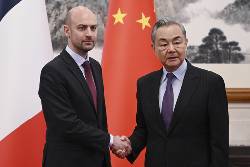BEIJING (AP) — French Foreign Minister Jean-Noël Barrot began a two-day visit to China on Thursday during which he is to hold talks with his Chinese counterpart on Ukraine and longstanding trade disputes between China and Europe.
Barrot went into a meeting with Chinese Foreign Minister Wang Yi shortly before noon, to be followed by a news conference and luncheon. On Friday, he will travel to Shanghai for meetings with local officials and business leaders.
In opening remarks, Wang called on both countries to “choose multilateralism over unilateralism ... and pursue mutual benefit and win-win outcomes instead of decoupling and isolation." That echoed language frequently used by China in criticizing U.S. foreign policy and the Western-led political order.
France has been a staunch supporter of Ukraine in its struggle against Russian invasion, while Beijing has backed Russia diplomatically and provided an economic lifeline by buying Russian natural resources. Barrot's visit is an opportunity to gauge China's attitude on Ukraine ahead of a major French-hosted meeting on a possible peacekeeping force for the country.
The talks come as fissures are showing between the U.S. and Europe over support for Ukraine, with Washington increasingly seen as backing Moscow.
French President François Macron said Wednesday that a proposed European armed force could be deployed in Ukraine in under an eventual peace deal, and could “respond” to a Russian attack if Moscow launched one.
Europe has long complained of unfair Chinese trade practices that it says force European companies to take on Chinese partners, share business practices and result in a major Chinese trade surpluses.
The sides also issued a joint statement reaffirming cooperation on climate change marking the 10th anniversary of the Paris Agreement, saying “the agreement and its long-term goals even more requires all parties to inject political impetus into the international cooperation on jointly fighting climate change (and) protecting biodiversity and ecosystems."
China is both the largest producer and consumer of fossil fuels, mainly coal.
The administration of U.S. President Donald Trump has started the one-year process to once again pull out of the 2015 Paris climate agreement and, formalizing another withdrawal from both climate and foreign aid programs, the Trump administration has told world financial institutions that the U.S is pulling out of the international climate Loss and Damage Fund.
In its first 50 days, the Trump administration has eliminated or cut funding for environmental justice domestically, foreign aid, climate change and diversity, equity and inclusion.
...


